#Google Scholar
Text
If you're surrounded by people who call trans people by their deadnames, you're most likely in a hate group. But a possible alternate explanation is that you're in academia. And it's not because that many academics are openly transphobic -- they just don't know that the site they fully trust, Google Scholar, is telling them to do it.
Google Scholar was developed in 2004 and has changed very little since then. It supplanted a lot of hard-to-use library search indices by providing a Google-style interface with a single search box. Now it's the most name-recognized site for searching for almost any paper by almost anyone. One aspect of the design was, authors are just a kind of search term. An author is a cluster of different ways to abbreviate a name, like Firstname Lastname, Firstname M. Lastname, and F Lastname, and you might see different forms in different places, but the underlying name will never change.
This is because Google Scholar was built by, and for, cis men with unchanging Western-style names. The "almost anyone" who you can search for excludes trans people, among a lot of other people it represents poorly. And because Scholar will not change, it should perish.
I fought the goog, and the goog won
I changed my name in research, retroactively. I broke the assumptions of Google Scholar, and Google Scholar hid my papers from search results when it couldn't model what was going on with them. It would particularly suppress search results for my new name, which were just confusing distractors for the results it really wanted to show, for my deadname. If you ask it how to cite me, it will auto-generate you a citation of my deadname.
I fought hard to remove citations of my deadname, replace PDF files, take down papers I couldn't replace, take away all the evidence of my deadname that I possibly could. Not to keep it from the eyes of people, but to keep it out of the Google Scholar model. I partially succeeded in making my new name more searchable, and even got it to show up in the auto-generated citations in some circumstances.
For a fleeting moment, I claimed victory.
But Google Scholar countered by finding my absolute most obscure things that count as publications, ones that I can't kill because they were not really alive in the first place, and bringing them to the top of my search results, so it can use them to keep helpfully directing you to my deadname.
Signing in and claiming papers on an "author page" doesn't help, because author pages are one tiny link in search results that nobody clicks through, because the papers are already right there.
Most trans people quit research rather than deal with this, and even though I found myself with more energy and opportunity to fight for my name than most, I quit research too.
There! We fixed it for cis people
Google knows about this. I raised the issue with them in February 2019. It became an internal bug report in July 2019, which I have never seen, but from what I've heard about it, it quickly went far astray from what I was trying to tell them. "Allies" inside Google came up with extremely dumbass theories of how to represent trans people in a way that fit Google's preconceptions.
I've posted about the problem at various times on social media (mostly Twitter when that was a thing). I tweeted about how Google's name model doesn't even work for cis women, given that many women change their names at some point in their lives. This got some traction and led to an amazingly quick response, along the lines of "oh shit! We fixed it for cis women."
The new feature they added allowed a person (who had claimed papers using a Google account) to link together their multiple names, as long as they were okay with all the names being shown at the top of their search results. The first trans person to try using the feature was extremely surprised and dismayed by the prominence it gave to their deadname, and asked "do you think they talked to even a single trans person about this feature?"
Nobody has ever heard Anurag Acharya, the creator of Google Scholar, say anything about the problem of name changes on his platform, or really anything attributable to him at all. But I know he knows about it.
The one time we got their attention
Google got banned as a sponsor of Queer in AI, partially because of Google Scholar, though if you ask most people now they'll say it's because they profit from AI weapons systems. Which is also a thing. But Google Scholar was enough of a part of the issue that an exec actually got on the phone with non-Googlers about it for the first time.
The exec was Jeff Dean, head of AI, whose organization does not actually include Google Scholar. When pressed on the issue by Queer in AI, he defended Scholar's lack of name changes, saying -- I believe this to be a direct quote -- "we have to ensure accurate information". Calling trans people by their names does not fall under the category of "accurate information" to the latently transphobic Jeff Dean.
In another rare instance of public communication, a couple of painfully assimilationist trans Google FTEs promoted a horrible idea where publishers would have an API for informing Google that someone's name had changed in their archives. That's right, you wouldn't control your own name, dozens of publishers would, all with their own processes ranging from gatekeepy to nonexistent, and you'd have to out yourself and beg to every one of them to press the Here's A Trans Person button. The only good thing about this proposal is that it was so obviously unworkable that they didn't do it.
Aside: If you are a Google full time employee, and you are trans, you are assimilationist. I'm sorry. I know your life circumstances mean you have to be. There used to be non-assimilationists there, and they joined the union and got illegally fired in 2019, or they quit in solidarity with the people who were fired in 2019 or 2021, and that leaves you, keeping your head down and keeping your job. You're still reading this paragraph, and that's amazing, so here's what I need you to know: from your position, you cannot advocate for the needs of trans non-Googlers, unless you allow trans non-Googlers into the conversation.
Contract workers, though, you're cool. You fought for a trans man, working at a Google data center, to stop having to wear his deadname on his badge, and you won.
There is a solution
I know that Google would not invest a lot of development effort into fixing a pet project like Google Scholar (though, again, "we fixed it for cis women" came remarkably quickly). I know that Google is institutionally incapable of letting people control their own identity without being a gatekeeper, that it's just not in the realm of things they dream of.
There is still a solution. It's so easy. It plays to Google's strengths. There's even a business argument for it.
They just need to shut it down.
Google Scholar can have a plot in the Google graveyard next to Hangouts, Picasa, AngularJS, Cardboard, Inbox, Orkut, Knol, and the dearly departed Reader. It will be missed, for a bit, and then real librarians and archivists can get back to doing the job that Google monopolized. They'll know how to do it better this time. The Internet Archive is already doing it, and they let trans people change their names.
I made a site about all this, scholar.hasfailed.us. I haven't been raising the issue enough since the fall of Twitter, and I think it's time that I get back to it.
#google#tech#tech giants#transphobia#trans#lgbt#google scholar#academia#my uploads#my uploads (unjank)
564 notes
·
View notes
Text


WELL DAMN
You know its gotta be a reliable paper when it was apparently authored by the fossil animals themselves
343 notes
·
View notes
Text
when the hyperfixation gets so bad you pull out this bad boy
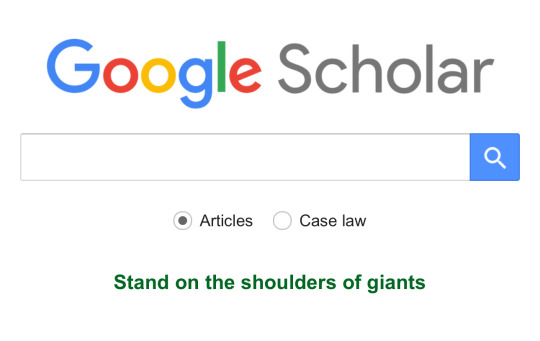
#i be#reading articles#like no other#some of these bitches be peer-reviewed too this is great#yes this is about#disco elysium#maybe a little bit of bioshock?#i’ll tag it anyway#bioshock#bioshock 2#google scholar#google
49 notes
·
View notes
Note
hi sophie! ive been following for a while now, and i have a question- where do you look for all your sources? or rather, how do you find them?
im not very good at spotting credible, reliable and unbiased sources especially if Im searching online, and you also have quite a few older studies and write ups! its really interesting to see all these studies and artifiacts of human culture, and i wanna study it myself!
Most, I find on Google Scholar. And I try to check out the authors and publishers if I can to see their credentials and reputation.
I think most people probably already know this, but if you don't, it's always good to remember that you can search for specific terms with quotations.
If you want to learn about how psychologists use terms like "personality states", searching for this:
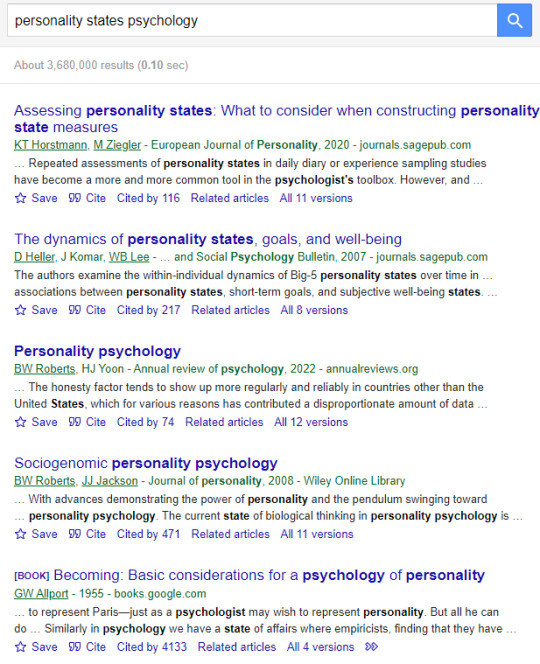
gives poorer results than this:
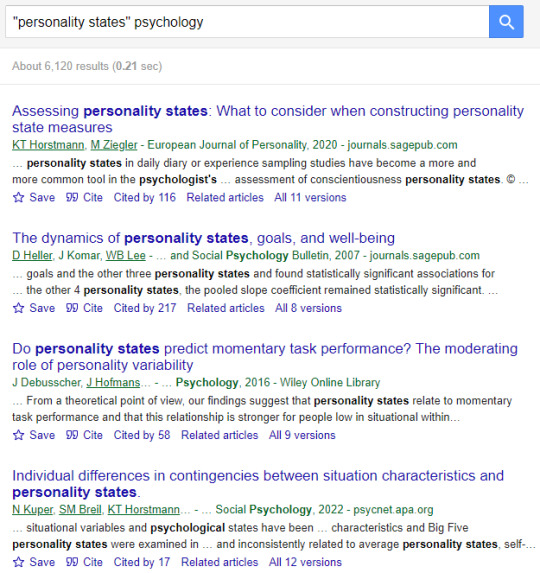
Always use quotation marks to narrow down the subject when applicable.
Others, I find through collections other people have gathered before me. A good way to find sources I found is just to check citations. If you see a paper claim something that they cite a source for, you can check the citations and go back further. And if an article in a citation is paywalled, you can often find it on Sci-Hub by copying and pasting the DOI.
Hope that helps! 😁
#psychology#science#psychiatry#sources#google scholar#google#search#plural#plurality#multiplicity#sysblr#actually plural#actually a system
31 notes
·
View notes
Text
I want to talk about something today. Something very important for younger people and newer people coming out.
Research with legitimate sources, aka scholarly articles and medical journals/studies. Wiki is not a good source, people can change info at any point true or untrue.
We want to look for articles with medical and area professionals clearly placing their name in and on the article, or the most reliable sources are called scholarly articles and medical journals/studies, also some gender affirming clinics lay out a lot of information on their websites, most clinics dont mind answering your questions or concerns via email or phone (they may get back to you at a later date). When looking for information, you want peer reviewed medical information. Google has these features that can help narrow down your search for more accurate results. Using quotes around exact words or phrases is a trick to narrow down to more on topic search results.
Also, use Google Scholar (just type "Google scholar" into the search bar to find only actual medical articles and studies. Even lawsuits.
This is the google search bar for scholarly information below:
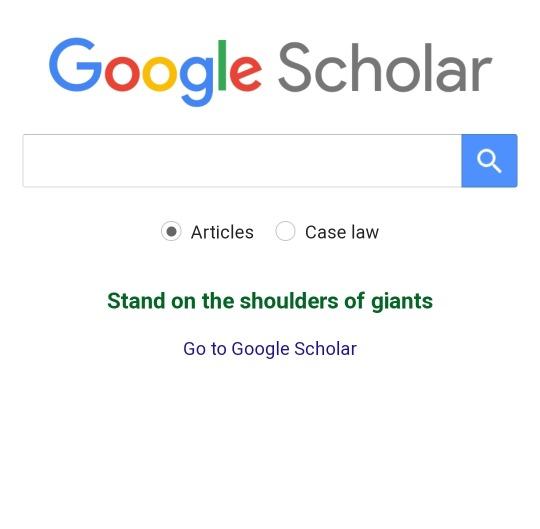
****READ THE ARTICLE FROM START TO FINISH OR AT LEAST THE PART(S) THAT PORTAIN TO YOUR RESEARCH!(some articles can include more than one study)****
Don't only use one source for your information, find as many as you can until you feel confident in the field of medicines and your concolusions about them. Information you use should be verified by several responsibly written articles, journals, and/or studies.
Call surgeons' offices, ask questions.
Research doctors in your area or a doctor you really like, again don't be afraid to call or email clinics!
When it comes to surgery and your body, if you have a bad feeling, any bad gut feelings before they put you under, about the surgeron or their methods, even team. You can back out until you are knocked out. You can say no as soon as you walk into the surgical suite. You worry about you.
Please, when going onto transgender groups (facebook and stuff), that not everyone is being genuine with you. People can be anything or anyone on the internet, behind that screen. I see trans people spreading anti-transtional propaganda (not on purpose), and they don't notice or know better. The negative people tend to pick out their victims early, cling onto someone newer in transitioning or even just joining the group. They probably try getting chummy really fast, getting into a lot of detail very early. They will start bringing up [negative] transitional things when they have nothing to do with the conversation you are having. It's a red flag when you can't talk about anything but "transitioning," and its a sign you need to block if all they say are negative, things. Life happens, but you don't need to drown yourself in negativity. Beware of people on the internet. Their intent is not always good, anyone can lie, anyone can find fake pictures for their profile, anyone can pretend to be someone they are not. Some of us should know that well as trans folk. Some people are even legitimate and are perhaps mad/ unhappy about their results and tend to use way overly dramatic words to describe their results, these people usually aren't telling you the whole truth. People also tend not to want to put any blame on themselves. If you aren't being honest yourself about your results and what and where things went wrong thats not okay. That,or telling someone not to do something that prevents transitioning or calming their dysphoria, that's considered transphobia.
It's important to also know that Facebook, Twitter, etc. are often looked at by employers, so many people will not use their own profiles to be a imaginary person.
Edit: Yes, transgender people can be transphobic as well. Look up Caitlin Jenner and what she's said and tried to do. Let me tell you now, she said transwomen should not be allowed to compete in sporting events, claiming "allowing transwomen to compete destroys women's sports" . So please, if you use that card, put it back in the deck. It's not true, and it's just a wrong blanket statement altogether. There are people who finish their transition and forget they had the rights they want taken away.
I want you to know and it's important to know many end results almost solely rely on the person and how they take care of themselves pre-op and post-op (yes taking care of your body before matters for optimum results). If you are heavier, your body has a harder time healing. This can cause complications and less favorable results because of those complications. I do have a post on being larger and surgical complications that are involved with that. (Here are some links about plus sized risks and general risks: plus size, general risks)
From Dad Shadow: Remember, don't tell anyone online personal information, even if you have been talking for years. Also, do not place yourself (ex. "Im gunna to go to the Starbucks on fifth around the corner from my house." this is especially bad if they may know your partial location) Someone can figure out your identity/location. Don't reveal anything you'd be asked to use as an account recovery question. When I was a younger adult, I saw someone post an image of a girl he met on 'Omegle', saying, "They accidentally got disconnected." Within two hours, everything about this girl was on this thread... from her name, where she was attending school, her personal address, her Facebook. All of it. It was more than one person looking and posting as well. People can be like this... I know you know, but the Dad in me wants to remind you. Browse safely!
I hope you read this and found it helpful everyone. I felt this is a need and it doesn't need post secondary education classes to teach you how to properly find sourced information for reports (same as your knowledge on the subject you are talking about).
P.s keeping your skin elasticity is very important, so mosturize your pecks, let it dry, then put on your binder.
Stay Golden Everyone ✌️ 💙 💜
#transgender#trans ftm#transman#ftm transition#ask me things#phalloplasty#ftm phalloplasty#phalloplasty blog#lgbtq#phallo education#ftm top education#ftm surgery information#how to properly find sourced information#this is how and where you should be looking#internet safety#internet searching#getting correct information#unbiased informational sources#google scholar
30 notes
·
View notes
Text
A Fantastic Resource For Finding Information
Good morning everyone! I just wanted to pop in and inform everyone about a fantastic resource anyone can use to find information about nearly any topic that the brain can even think of. I use it constantly for my job as a researcher and it helps me out A LOT. This resource can be used for a job, writing essays, or even just satisfying a person's curiosity on a certain topic they want to learn about!
Google Scholar is an online resource that is free for anyone to use! It was released on November 20th, 2004, and is absolutely FILLED with peer-reviewed online academic journals and books, conference papers, theses and dissertations, preprints, abstracts, technical reports, and other scholarly literature, including court opinions and patents. Whatever you decide to search up, under each link/article/book/etc. will be options to save, cite (For when writing your own essay or article), tell you how many others have citied that specific article, and give you an option to view related articles and any other versions of that exact article. On the left side of the resource, you can specify what exact thing you are looking for by setting a specific range of when the article was posted, if you want to sort the results by relevance or date, what type of article you are looking for, and if you want the article to include patent/citations or not. Underneath that, you can even make an alert for a certain topic so that you will be notified when a new article is posted about that topic.
"But, Jerome, where do I go to find this amazing resource?" I'm glad you asked! You just need to search up, "Google Scholar" into your search bar and it should be the first link to pop up. I have also included a link to it at the bottom of this post, right before the tags. Happy researching!
https://g.co/kgs/UpVwU42
#LITERALLY SO USEFUL#SO EASY TO USE#without this I would not be nearly as good at my job as I am right now#I would spend most of my time at the library without this#but because I have it i can work very well without barely ever having to leave the house#Have fun with your researching!#jrwi suckening#jrwi the suckening#jerome jrwi#jrwi jerome#in character#jrwi#jrwi rp#the suckening#google scholar#google
9 notes
·
View notes
Text
All I was trying to do was search up if anyone had said grouping friends together was a bad idea.
NOT THIS GOOGLE!!
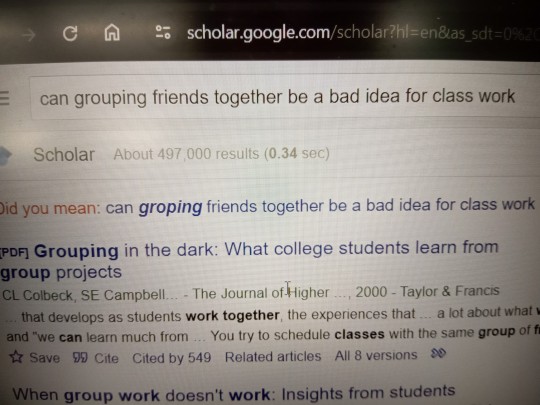
GOOGLE SCHOLAR WHY HAST THOU FORSAKEN MEEE????
I'M TRYING TO FOCUS AND YOU GOT ME DISTRACTED, YOU WERE SUPPOSED TO FIX THE ISSUE NOT MAKE IT WORSE 😭😭
#i actually cant#*giggling*#its so out of left field wtf 😂😭#dead#help 💀💀💀#google#google scholar#assignmentwriting
2 notes
·
View notes
Text
Not bad...
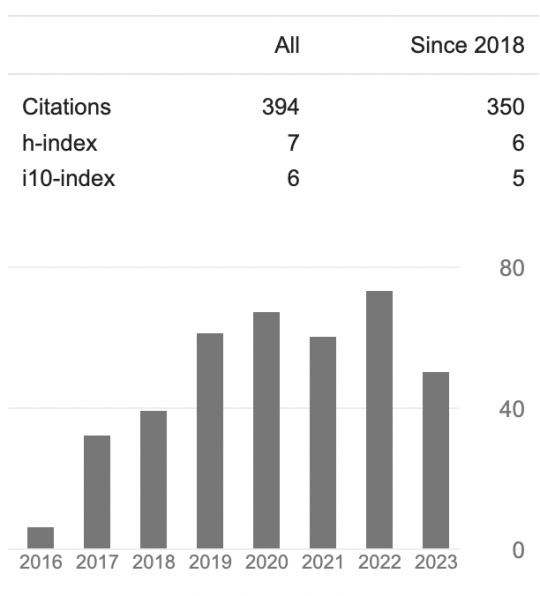
Almost 80 citations of my research articles in the last year... I would say it’s not bad. It eases a bit my feeling of “I don’t know what I am doing here!” that I sometimes have.
#postdoc#research#science#output#research articles#women in science#physics#biophysics#life sciences#chemistry#citations#achievements#impostor syndrome#bright future#google scholar#original content
10 notes
·
View notes
Text
Opened Google scholar to look for paleo papers and I have no memory of what was going through my mind during my last session

6 notes
·
View notes
Audio
(paulorfreitas)
#SoundCloud#music#paulorfreitas#Ética da informação#google scholar#inteligência artificial#pesquisa#plágio
1 note
·
View note
Text

#fraud related to fraudulent portrayal of prior contact or communications or the existence of such things#counsel#criminals providing supposedly useful but deliberately ineffective life support or services#recusal#the accused's policies or orders preventing actions against them#those associated with the accused#public knowledge of suspicion or accusation#public trial#vested interests in outcomes#please read and analyze all related information#bradley carl geiger#google scholar
0 notes
Text
Google Scholar Nedir?
Google Scholar nedir, akademik çalışmalar, makaleler, tezler, kitaplar, konferans bildirileri ve diğer bilimsel kaynaklar gibi akademik literatüre erişim sağlayan, ücretsiz bir arama motorudur. Google tarafından 2004 yılında başlatılan bu hizmet, araştırmacılar, akademisyenler, öğrenciler ve bilim meraklıları için önemli bir kaynak olmuştur. Google Scholar, geniş bir akademik veri tabanına sahiptir ve kullanıcıların belirli konularda kapsamlı bilgiye ulaşmasını kolaylaştırır.
Google Scholar Nasıl Alınır?
Google Scholar, kullanıcıların akademik makalelere, tezlere, kitaplara ve diğer bilimsel kaynaklara ücretsiz olarak erişebileceği bir arama motorudur. Ancak “Google Scholar nasıl alınır?” ifadesi, genellikle Google Scholar’a nasıl erişileceği ve kullanılabileceği konusunda bir rehber anlamına gelir. İşte Google Scholar’ı kullanmaya başlamak için izlemeniz gereken adımlar:
1. Google Scholar’a Erişim: Google Scholar’ı kullanmak için öncelikle web tarayıcınız üzerinden Google Scholar sitesine gitmeniz gerekir. Bu platform, tamamen ücretsizdir ve herhangi bir üyelik veya indirme gerektirmez.
2. Arama Yapma: Google Scholar’a girdikten sonra, arama çubuğuna anahtar kelimelerinizi, yazar adını veya makale başlığını yazarak arama yapabilirsiniz. Google Scholar, ilgili akademik kaynakları size listeleyecektir.
3. Kaynaklara Erişim: Arama sonuçlarında yer alan makalelerin bir kısmı tam metin olarak ücretsiz sunulurken, bazıları ise sadece özet veya alıntı olarak görüntülenebilir. Tam metin erişimi sağlayan bağlantılar genellikle “PDF” veya “HTML” olarak belirtilir.

Google Scholar Güvenilir mi?
Google Scholar, dünya genelinde milyonlarca akademisyen, araştırmacı ve öğrenci tarafından kullanılan güvenilir bir akademik arama motorudur. Ancak, herhangi bir bilgi kaynağı gibi, Google Scholar da kullanıcıların dikkatli ve eleştirel bir gözle değerlendirmesi gereken bir platformdur.
1. Güvenilirlik ve Kaynaklar: Google Scholar, çeşitli akademik yayınlardan, üniversite arşivlerinden, bilimsel dergilerden ve konferans bildirilerinden içerik sunar. Bu içerikler genellikle hakemli dergilerden alınır ve bu nedenle akademik dünyada güvenilir kabul edilir. Ancak, bazı içerikler doğrudan dergilerden değil, ön baskılar veya diğer açık erişim kaynaklardan gelebilir. Bu nedenle, kaynakların güvenilirliği konusunda her zaman dikkatli olunmalıdır.
2. Alıntı Sayıları ve H-indeksi: Google Scholar, bir makalenin ne kadar alıntılandığını gösterir ve bu sayılar, bir çalışmanın akademik dünyadaki etkisini anlamak için önemli bir göstergedir. Ancak, bu alıntıların kalitesi ve alıntı yapan çalışmaların güvenilirliği de değerlendirilmelidir.
3. Platformun Avantajları: Google Scholar, geniş bir akademik veri tabanına sahiptir ve kullanıcıların en güncel araştırmalara erişmesini sağlar. Aynı zamanda, akademik dünyada popüler olan bir çalışmayı hızlıca bulmak için idealdir. Ancak, sonuçları değerlendirirken her zaman kaynağın yayınlandığı dergi veya konferansın saygınlığına dikkat etmek gerekir.
4. Potansiyel Dezavantajlar: Google Scholar, bazen düşük kaliteli veya az denetimden geçmiş çalışmaların da arama sonuçlarında yer almasına izin verebilir. Bu nedenle, araştırmacıların sonuçları dikkatlice değerlendirmesi ve mümkünse çalışmaların yayınlandığı dergilerin itibarını göz önünde bulundurması önemlidir.
Sonuç olarak, Google Scholar güvenilir bir akademik kaynak olarak kabul edilir, ancak kullanıcıların arama sonuçlarını eleştirel bir bakış açısıyla değerlendirmeleri önemlidir.
Google Scholar Makale Nasıl Yüklenir?
Google Scholar, doğrudan makale yüklemek için bir platform değildir, ancak akademik yayınlarınızın Google Scholar tarafından indekslenmesini sağlayabilirsiniz. İşte makalelerinizi Google Scholar’a nasıl ekleyebileceğiniz konusunda adımlar:
1. Akademik Profil Oluşturma: Google Scholar’da makalelerinizin listelenmesi için öncelikle bir akademik profil oluşturmanız gerekir. Bir Google hesabınızla Google Scholar’a giriş yaparak bu işlemi gerçekleştirebilirsiniz. Profilinizi oluştururken, adınız, çalıştığınız kurum ve araştırma alanlarınız gibi bilgileri eklemeniz gerekir.2. Yayınlarınızı Eklemek: Profilinizi oluşturduktan sonra, “Yayın ekle” seçeneğine tıklayarak yayınlarınızı ekleyebilirsiniz. Google Scholar, adınızı ve araştırma alanınızı kullanarak sizinle ilişkili olabilecek yayınları otomatik olarak bulur ve bunları profilinize eklemeyi teklif eder. Bu yayınları manuel olarak da ekleyebilirsiniz.
3. Manuel Makale Ekleme: Google Scholar, makalenizi otomatik olarak bulamıyorsa, makale bilgilerini manuel olarak ekleyebilirsiniz. Bunun için “Yayın ekle” seçeneği altındaki “Makale ekle” butonuna tıklayarak makale başlığı, yazarlar, yayınlandığı yer, yıl ve diğer bilgileri girmeniz gerekir.
4. Makalelerinizi Güncel Tutma: Yayınlarınızın Google Scholar profilinizde güncel kalmasını sağlamak önemlidir. Yeni yayınlarınızı ekleyebilir, eski çalışmalarınızı düzenleyebilir veya Google Scholar’ın otomatik güncellemelerini kullanarak profilinizi güncel tutabilirsiniz.
5. Yükleme Sırasında Dikkat Edilmesi Gerekenler: Google Scholar’a eklediğiniz makalelerin yayınlandığı yerlerin ve dergilerin güvenilir olmasına dikkat edin. Çünkü bu, makalelerinizin Google Scholar tarafından daha kolay indekslenmesini sağlar. Ayrıca, her yayının tam ve doğru bilgilerle eklenmesi, arama sonuçlarında daha görünür olmanızı sağlar.
Google Scholar’da makale yükleme işlemi, doğrudan platforma makale yüklemek şeklinde değil, akademik profil oluşturma ve yayınlarınızı bu profil üzerinden yönetme süreciyle gerçekleştirilir. Bu sayede, çalışmalarınızın Google Scholar’da görünürlüğünü artırabilir ve akademik toplulukta daha geniş bir kitleye ulaşabilirsiniz.Google Scholar’ın Özellikleri ve Avantajları
1. Kapsamlı Arama İmkanları: Google Scholar, geniş bir akademik kaynak yelpazesine erişim sağlar. Kullanıcılar, farklı disiplinlerdeki makaleleri, tezleri, kitapları ve diğer akademik çalışmaları bulabilirler. Bu, özellikle disiplinler arası araştırma yapmak isteyenler için büyük bir avantajdır.
2. Akademik Alıntı İzleme: Google Scholar, akademik makalelerin kaç kez alıntılandığını gösterir. Bu özellik, bir çalışmanın akademik dünyadaki etkisini değerlendirmek için kullanışlıdır. Araştırmacılar, alıntılama sayısını izleyerek kendi çalışmalarının ne kadar geniş bir kitle tarafından kullanıldığını görebilirler.
3. Kolay Erişim ve Kullanım: Google Scholar, kullanıcı dostu bir arayüze sahiptir ve kullanımı oldukça basittir. Arama sonuçları, en alakalı ve saygın kaynaklardan başlayarak sıralanır. Bu, kullanıcıların aradıkları bilgiyi hızlıca bulmalarını sağlar.
4. Akademik Profil Oluşturma: Araştırmacılar, Google Scholar üzerinde kendi akademik profillerini oluşturabilirler. Bu profiller, yayınlanan makalelerin listesi, alıntılama sayıları ve H-indeksi gibi bilgileri içerir. Bu özellik, araştırmacıların kendi akademik katkılarını izlemelerine ve diğer akademisyenlerle bağlantı kurmalarına olanak tanır.

Google Scholar’ın Kullanımı
1. Arama Yapma: Google Scholar’ı kullanmak oldukça basittir. Anahtar kelimeleri veya konuyu arama çubuğuna yazarak, ilgili akademik çalışmaları bulabilirsiniz. Arama sonuçları, en alakalı olanlardan başlayarak sıralanır ve kaynakların başlıkları, yazarları, yayın yılı gibi bilgiler sunulur.2. Alıntılama Takibi: Google Scholar, her bir çalışmanın kaç kez alıntılandığını gösterir. Bu bilgi, çalışmanın akademik toplulukta ne kadar etkili olduğunu anlamak için kullanılabilir. Ayrıca, “Alıntılayanlar” özelliği, belirli bir makaleyi alıntılayan diğer çalışmaları görüntülemenizi sağlar.
3. Akademik Profil Yönetimi: Araştırmacılar, Google Scholar üzerinden kendi profillerini oluşturabilir ve yayınlarını takip edebilirler. Bu profil, diğer akademisyenlerle ağ kurma ve kendi çalışmalarını sergileme açısından önemlidir. Profilde yer alan alıntı sayıları ve H-indeksi, bir araştırmacının akademik performansını göstermeye yardımcı olur.
4. Kapsamlı Literatür Taraması: Google Scholar, belirli bir konuda kapsamlı bir literatür taraması yapmak için idealdir. Kullanıcılar, bir konudaki en önemli makaleleri ve araştırmaları bulabilir, bu çalışmalar arasındaki bağlantıları inceleyebilir ve literatürün genel eğilimlerini anlayabilirler.
Google Scholar Kullanmanın Avantajları
1. Ücretsiz Erişim:
Google Scholar, kullanıcıların akademik kaynaklara ücretsiz olarak erişmesini sağlar. Bu, araştırmacılar ve öğrenciler için büyük bir avantajdır, çünkü çoğu akademik veritabanı ücretli erişim gerektirir.
2. Geniş Kapsam:
Google Scholar, bilimsel dergilerden, üniversite yayınlarından, akademik konferanslardan ve diğer bilimsel kaynaklardan içerik sunar.Bu geniş kapsam, kullanıcıların farklı alanlardaki en güncel ve önemli çalışmalara ulaşmasını sağlar.
3. Kullanıcı Dostu Arayüz:
Google Scholar’ın basit ve anlaşılır arayüzü, her seviyeden kullanıcı için idealdir. Hem deneyimli akademisyenler hem de öğrenciler, platformu kolayca kullanabilir ve aradıkları bilgilere hızlıca ulaşabilir.
4. Araştırma Kolaylığı:
Google Scholar, araştırma yapmayı kolaylaştırır. Belirli bir konuda derinlemesine bilgi edinmek isteyenler, ilgili makaleler ve çalışmaları bulmak için platformu etkin bir şekilde kullanabilirler.
5. Global Erişim:
Google Scholar, dünya genelindeki akademik kaynaklara erişim sağlar. Bu, araştırmacıların farklı kültürler ve coğrafyalardan gelen çalışmaları incelemesine olanak tanır.
Google Scholar, akademik araştırmalar için vazgeçilmez bir araçtır. Geniş veri tabanı, kullanıcı dostu arayüzü ve ücretsiz erişim imkanı, bu platformu akademik dünyada önemli bir kaynak haline getirmiştir. Araştırmacılar, öğrenciler ve bilim meraklıları, Google Scholar aracılığıyla geniş bir literatüre ulaşabilir, çalışmalarını etkili bir şekilde takip edebilir ve akademik profillerini yönetebilirler. Google Scholar, dijital çağın sunduğu en güçlü akademik araçlardan biridir ve bilimsel bilginin yayılmasına büyük katkı sağlar.
0 notes
Note
Quick question how do you tell if a source is reliable or not? I’m trying to look into MADD but not sure where to start
I use Google Scholar to find sources. Then look at the publisher and/or authors.
By the way, a ton of the research on MADD that you'll want to look into was written by Eli Somer, who originally coined the term. If you want to learn more about the disorder, his papers are probably the best places to start.
Here's one where he discussed MADD as a dissociative disorders:
#maladaptive daydreaming#madd#psychology#psychiatry#science#google scholar#academic papers#information#mental health
15 notes
·
View notes
Text

I wish this was named something else before peer review
0 notes
Text
READ GOOGLE SCHOLAR
scholar.google.com
0 notes